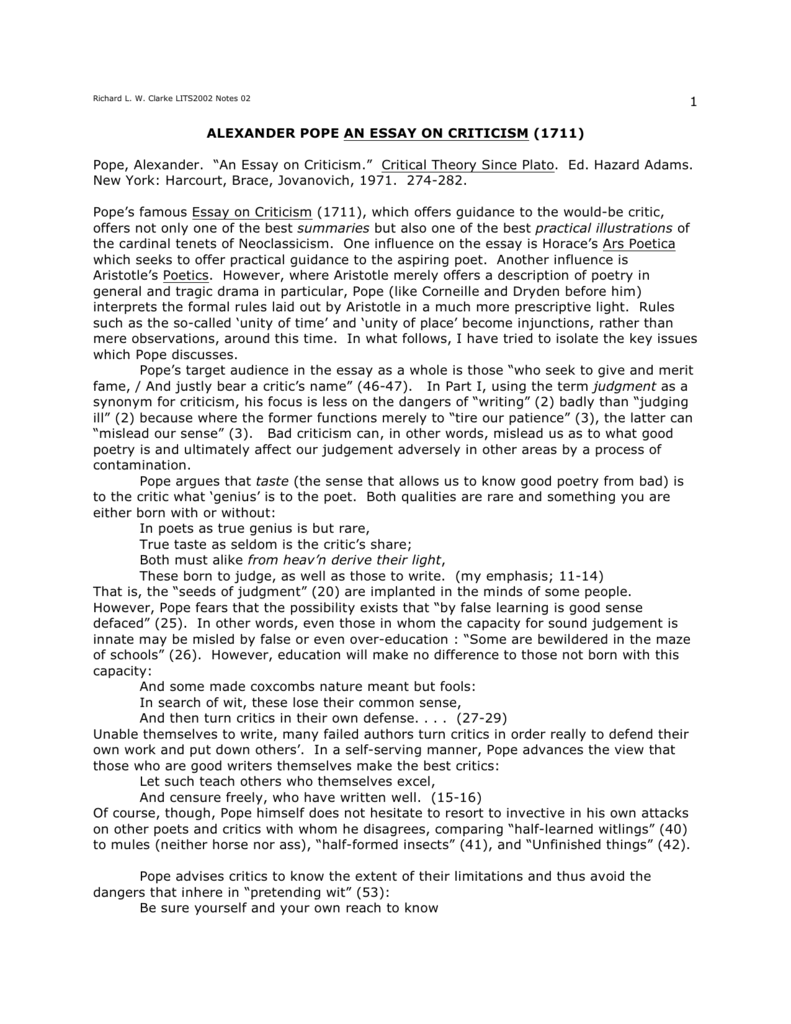
Jul 08, · Analysis of Alexander Pope’s An Essay on Man By Nasrullah Mambrol on July 8, • (0) By the time Alexander Pope chose to publish his An Essay on Man (), he had received thorough and undeserved criticism from the poetasters, or “dunces,” whose activities he so often correctly lambasted, most notably in The Dunciad ().Estimated Reading Time: 7 mins Feb 25, · Alexander Pope ’s “An Essay on Criticism” is largely influenced by ancient poets, classical models of art, and Pope’s Catholic beliefs. The poem revolves around questions of whether poets should Essays On Criticism By Alexander Pope. Home / Uncategorized / Essays On Criticism By Alexander Pope. Previous. On Alexander Essays Pope By Criticism
Alexander Pope Criticism | English Summary
Back to: Literary Criticism Course. His essay concerns with good literary criticism and poetry, and how they stay in harmony. To harmonize them, he shows a relation between the classical notion of nature and wit, both being essential to poetry as well as criticism. He is of the view that both poetry and criticism are linked to nature and wit, and the best of both are divinely inspired. Pope regards not only poetry but also criticism as an art.
To him, both are based on the same literary principles. Though, there are some specific rules that he ascribes to criticism. The critic, he says, must examine an author as not being familiar with his own capacities but being aware of all aspects of the author. He further suggests that criticism must have a moral sensibility, modesty and caution.
Pope warns critics that they avoid bookish alexander pope essay on criticism analysis as it results in extravagant language. Poetry and criticism, he suggests, are two branches of art. He keeps them in moral and theological domain too.
He also suggests that a poet ought to have critical faculties too so that the creative process is carried out in a balanced and controlled way. His emphasis is on the following nature, the act that relates to wit and judgment which has an overlapping relation as do poetry and criticism. His advice is that nature should be the standard to be followed before one makes a judgment. He suggests, like all neo-classical critics and writers that nature should become the inspiration to create art.
It is pride that causes subjectivity, leads to individualism, and mass balance of wit and judgment. Pope, consequently, attempts to synthesize classical literary traditions with nature, alexander pope essay on criticism analysis.
He says that criticism in the ancient Greece one achieved a high status alexander pope essay on criticism analysis now has declined. A critic task was then to judge the art meticulously, to appreciate, but now that has been replaced by attacks on poets.
He advises both critic and poet to refrain from any biases and to follow ancient rules. Pope praises Horace as a supreme critic in the literary tradition. Others who are praiseworthy to Pope are Dionysius of Halicarnassus, Petronius, Quintilian, and Longinus. He considers them true representatives of the classical tradition. He himself sets forth his ideas as a descendant of Renaissance thinkers who looked back to the classical writers as their ideals. What Pope, as a critic and poet, endeavours in his essay is to trace the background of true criticism, to show its overlapping relation with poetry, while both being based on the standard of nature and wit.
Skip to content, alexander pope essay on criticism analysis. Previous Lesson John Dryden. Next Lesson Aphra Behn. Close Menu. Add English Summary to home Add!
An Essay on Criticism, Alexander Pope
, time: 12:14An Essay on Criticism - Wikipedia

Feb 28, · “An Essay on Criticism” () is a work of both poetry and criticism. Pope attempts in this long, three-part poem to examine neoclassical aesthetics in poetry and argues that the best kind of Jul 08, · Analysis of Alexander Pope’s An Essay on Criticism. By Nasrullah Mambrol on July 8, • (1) An Essay on Criticism () was Pope’s first independent work, published anonymously through an obscure bookseller [12–13]. Its implicit claim to authority is not based on a lifetime’s creative work or a prestigious commission but, riskily, on the skill and argument of Estimated Reading Time: 8 mins In his essay on Criticism, Alexander Pope says, "A little learning is a dangerous thing." • There should be genuine concern for the other person. Mary Kay Ash a cosmetologist counsels "Sandwich each bit of criticism between two layers of praise."

No comments:
Post a Comment